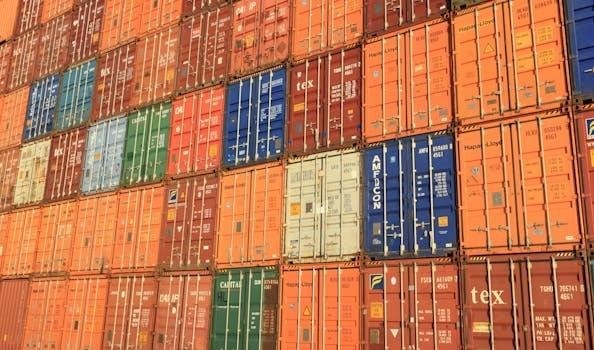Shippers List for Freight Brokers 2023⁚ A Comprehensive Guide
In the dynamic world of freight brokerage in 2023, having a comprehensive and updated shipper list is paramount. This guide provides valuable insights, resources, and strategies for freight brokers looking to enhance their prospecting efforts.
For freight brokers aiming to thrive in 2023, a well-curated shipper list is indispensable. This resource serves as a gateway to potential clients and freight opportunities. It’s more than just a directory; it’s a strategic asset that can significantly impact a broker’s success. This introduction sets the stage for understanding how to leverage shipper lists effectively, find quality leads, and avoid common pitfalls, like outdated information or scams. Mastering the use of shipper lists helps brokers secure loads and build lasting relationships with shippers.
What is a Shipper List?
A shipper list is a curated directory of businesses that require freight services. For freight brokers, it’s a vital tool for identifying potential clients and securing new loads, updated for 2023.
Definition and Purpose of a Shipper List
A shipper list serves as a comprehensive compilation of potential clients for freight brokers, providing essential contact information and business details. Its primary purpose is to streamline the prospecting process, enabling brokers to identify and connect with companies that regularly ship goods. By offering a targeted directory, shipper lists empower brokers to efficiently expand their network, secure new loads, and ultimately, grow their freight brokerage business in 2023 and beyond, using resources like updated PDF documents.
Benefits of Using a Shipper List for Freight Brokers
Utilizing a shipper list offers freight brokers a multitude of advantages, including streamlined lead generation, enhanced prospecting efficiency, and increased chances of securing new business. A well-curated list saves time by providing readily available contact details and company information, improving brokers’ ability to target specific industries and geographical areas. Access to an updated shipper list, like a 2023 PDF version, ensures brokers connect with active shippers, boosting their sales pipeline and fostering sustainable growth in a competitive market.

Key Components of a Useful Shipper List
A valuable shipper list includes accurate contact details, company names, and locations. Details about shipping volumes, frequency, and types of commodities are also important. Updated information is crucial for success.
Essential Data Fields⁚ Company Name, Contact Information, etc.
A robust shipper list should contain essential data fields to facilitate effective prospecting. These fields include the company name, a primary point of contact, their job title, and direct contact information such as phone numbers and email addresses. The physical mailing address, including city, state, and postal code, is also necessary. Specifying the industry or type of products the company ships is critical. Having this structured data ensures efficient outreach and qualification of potential shipping partners for freight brokers.
Importance of Accurate and Updated Information
Maintaining accurate and updated information within your shipper list is crucial for success in freight brokerage. Outdated contact details or incorrect company information can lead to wasted time and missed opportunities. Regularly verifying and updating data ensures that your outreach efforts are directed towards valid leads. Accurate information enhances the efficiency of prospecting, improves communication, and helps build credibility with potential clients. Reliable data is the foundation for effective relationship-building and securing valuable shipping contracts.
Where to Find Shipper Lists
Locating reliable shipper lists is essential for freight brokers. Numerous online directories and databases offer potential leads. Weigh the pros and cons of paid versus free lists to determine the best approach for your business.
Online Directories and Databases
Several online directories and databases serve as valuable resources for freight brokers seeking shipper information. These platforms often aggregate data from various sources, providing a centralized location to discover potential clients. Platforms like Apollo, industry-specific databases, and general business directories can offer extensive lists of companies that ship freight. It’s crucial to evaluate the credibility and update frequency of these sources to ensure the data is accurate and relevant for effective prospecting and lead generation.
Paid vs. Free Shipper Lists⁚ Pros and Cons
Freight brokers often face the decision of using paid or free shipper lists. Free lists may seem appealing due to their cost-effectiveness. However, they often contain outdated or inaccurate information, potentially wasting time and resources. Paid lists, while requiring an investment, typically offer more accurate, verified, and comprehensive data. This includes detailed contact information and business insights. Weighing the cost against the potential for higher-quality leads and increased efficiency is crucial when selecting a shipper list.
Creating Your Own Shipper List
Building a shipper list involves research and networking. It allows customization to target specific niches. Utilizing online tools and industry contacts can lead to a valuable, tailored database for freight brokers.
Methods for Identifying Potential Shippers
Identifying potential shippers requires strategic approaches. Start by exploring online directories and databases, filtering by industry and location. Analyze import bills of lading to uncover companies involved in shipping activities. Monitor industry publications and news for announcements of expansions or new facilities. Attend trade shows and conferences to network directly with potential clients. Leverage LinkedIn and other professional networks to identify key decision-makers within target companies. Utilize search engines with specific keywords related to shipping and logistics. Finally, consider using lead generation tools designed for the freight industry to streamline your search process.
Utilizing LinkedIn and Other Professional Networks
LinkedIn and other professional platforms are invaluable for connecting with potential shippers. Optimize your profile to showcase your expertise as a freight broker. Actively search for relevant companies and professionals within your target industries. Join industry-specific groups to participate in discussions and build relationships. Engage with content shared by potential shippers to demonstrate your interest and knowledge. Send personalized connection requests, highlighting mutual connections or shared interests. Use LinkedIn Sales Navigator to refine your search and identify key decision-makers. Participate in relevant online forums and communities to establish yourself as a trusted resource. Remember to always maintain a professional and helpful demeanor.

Maximizing the Value of Your Shipper List
To truly maximize a shipper list, focus on effective prospecting and relationship building. Consistent outreach and personalized communication are key. Nurturing relationships will lead to long-term partnerships and increased freight opportunities.
Effective Prospecting Techniques
Effective prospecting techniques for freight brokers involve strategically reaching out to potential shippers. This includes leveraging the information in the shipper list to identify their specific needs and pain points. Tailor your communication to address these needs directly. Use a multi-channel approach, combining email, phone calls, and social media outreach. Track your prospecting efforts and analyze the data to refine your strategies for optimal results. Remember, persistence and personalization are key components of successful prospecting in the freight brokerage industry.
Building Relationships with Shippers
Building strong relationships with shippers is crucial for long-term success in freight brokerage. Go beyond transactional interactions by understanding their business goals and challenges. Provide exceptional service and consistent communication to foster trust and loyalty. Offer valuable insights and solutions to help them optimize their supply chain. Attend industry events and network with shippers to build rapport. Remember, building relationships is a continuous process that requires dedication, empathy, and a genuine commitment to their success. Nurturing these relationships will lead to repeat business and valuable referrals.
Top Freight Brokerage Firms in 2023
Identifying leading freight brokerage firms in 2023 provides valuable insights into industry benchmarks. Examining their strategies offers learning opportunities for aspiring and established brokers. Revenue and market trends provide context for success.
Identifying Leading Companies by Revenue
Analyzing the revenue figures of top freight brokerage firms offers a clear perspective on market dominance and financial performance. C.H. Robinson Worldwide, Total Quality Logistics, and Coyote Logistics stand out. Examining revenue helps determine the scale of operations. Larger revenue often correlates with extensive networks, advanced technology, and a significant market share. By studying these leaders, freight brokers can benchmark their own progress and identify areas for growth and improvement in their business models. Revenue size is a key factor.
Key Players and Market Trends
Understanding the landscape of key players in the freight brokerage industry is vital for success. Companies like Arrive Logistics and Nolan Transportation Group are significant. Market trends in 2023 include the increasing use of technology, such as AI and automation. Shippers are prioritizing efficiency, transparency, and real-time tracking. Adapting to these trends and understanding the strategies employed by leading companies is crucial. Brokers must embrace digital solutions. They also must focus on building strong relationships with both shippers and carriers to maintain a competitive edge.

Free Resources for Finding Shippers
Freight brokers can leverage free online tools, platforms, and networks to find shippers. Networking at industry events, seeking referrals, and utilizing free directories can provide valuable leads for business growth.
Leveraging Free Online Tools and Platforms
Freight brokers can tap into a wealth of free online resources to discover potential shippers. Platforms like LinkedIn, industry-specific forums, and free online directories offer avenues to identify and connect with companies that require freight services. Utilizing search engines with targeted keywords such as “manufacturers” or “distributors” can also lead to valuable shipper prospects. Furthermore, exploring free government databases and industry associations can provide additional leads and contact information, all contributing to building a robust shipper network without incurring significant costs.
Networking and Referrals
Building a strong network within the transportation and logistics industry is crucial for freight brokers seeking new shippers. Attending industry events, joining relevant associations, and actively participating in online communities can lead to valuable connections and potential referrals. Cultivating relationships with existing clients and carriers can also open doors to new shipper opportunities. Word-of-mouth referrals are often highly effective, as they come with a built-in level of trust and credibility, making networking and referrals invaluable tools for expanding a freight broker’s shipper base.
Shipper List for Freight Brokers 2023 PDF
Accessing shipper lists in PDF format offers convenience for freight brokers. These PDFs can be easily shared, stored, and printed. However, ensure the list is updated and from a reputable source for accuracy.
Accessibility and Use of PDF Formats
The PDF format for shipper lists offers accessibility across various devices, ensuring freight brokers can access vital information on the go. Its widespread compatibility makes it a convenient choice for sharing data. However, PDFs may pose challenges when it comes to editing and updating information. To maximize their utility, consider using PDF editors to add notes, highlight key details, and ensure the list remains a dynamic resource. Always verify the source and date of the PDF to ensure the data’s accuracy for 2023 freight operations.
Editing and Customizing PDF Shipper Lists
To make the most of your 2023 shipper list in PDF format, customization is key. Utilize PDF editing software to add or modify contact information, incorporate notes on shipper preferences, and highlight potential leads. Tailor the list to match your specific brokerage needs by categorizing shippers based on industry, location, or freight type. Customization enables you to efficiently target prospects and personalize outreach, increasing your chances of securing new business. Regular editing ensures the list remains a relevant and valuable asset for your freight brokerage operations.

Avoiding Scams and Low-Quality Lists
In 2023, freight brokers must stay vigilant against shipper list scams. Prioritize data privacy and security, scrutinizing lists for red flags like outdated information. Verify data accuracy to avoid wasting time and resources on unproductive leads.
Identifying Red Flags and Inaccurate Data
When evaluating a shipper list for freight brokers in 2023, be alert for several red flags. Look out for outdated contact information, generic email addresses (like @gmail.com instead of a company domain), and inconsistencies in company details. Large discrepancies between the list and verified online sources should raise suspicion. Be wary of lists promising unrealistic numbers of shippers or lacking specific industry information. Always cross-reference data with platforms like LinkedIn or company websites to ensure accuracy and avoid scams, saving valuable time and resources.
Ensuring Data Privacy and Security
When handling shipper lists, particularly in PDF format, freight brokers must prioritize data privacy and security; Ensure that the list source complies with data protection regulations like GDPR or CCPA. Implement secure storage practices, such as encryption, to protect sensitive information from unauthorized access. Train personnel on data handling protocols and limit access to the shipper list to essential employees only. Regularly update security measures and use reputable software to avoid data breaches. By adhering to these practices, brokers maintain client trust and avoid legal repercussions.
The Future of Shipper Lists
The future of shipper lists involves integrating AI and automation for enhanced accuracy. Predictive analytics will improve lead generation, while real-time updates ensure data relevance. This evolution promises more efficient and effective freight brokerage operations.
Emerging Trends and Technologies
The landscape of shipper lists is evolving with the adoption of cutting-edge technologies. Cloud-based platforms are enabling real-time data sharing and collaboration, improving accessibility and efficiency for freight brokers. Advanced data analytics tools are being used to identify promising leads and predict shipping patterns, allowing brokers to proactively target potential clients. Mobile applications are also gaining traction, providing on-the-go access to shipper information. These trends are revolutionizing how brokers connect with shippers and secure business opportunities.
The Role of AI and Automation
AI and automation are poised to transform the way freight brokers utilize shipper lists. AI-powered tools can analyze vast datasets to identify high-potential shippers, predict their needs, and personalize outreach efforts. Automated data entry and validation can ensure accuracy and reduce manual work, freeing up brokers to focus on relationship building and negotiation. Chatbots and virtual assistants can handle initial inquiries and qualify leads, further streamlining the sales process. The integration of AI and automation promises to boost efficiency and effectiveness in the freight brokerage industry.
